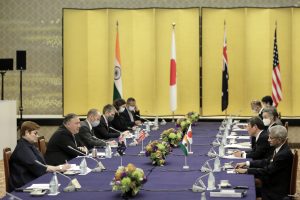Foreign ministers from Japan, Australia, India and the U.S. met in Tokyo as part of the Quadrilateral Security Dialogue (or Quad) last month. This was their second meeting, the first having been held in New York in September 2019, and it built on the inaugural discussion but also took into consideration the COVID-19 pandemic and the intensifying U.S.–China rivalry.
With the four countries growing increasingly wary of China’s intentions, they have been touting the concept of a Free and Open Indo-Pacific (FOIP), although their thinking here is hardly perfectly aligned. Nonetheless, these foreign ministers’ meetings have allowed them to identify some common ground.
The First Japan–Australia–India–U.S. Foreign Ministers’ Meeting in 2019 sought to affirm a general framework. The ministers began by stressing “their shared commitment to close cooperation on maritime security, quality infrastructure, and connectivity” based on “preserving and promoting a rules-based order in the region.” Second, they identified and discussed “cooperative initiatives including counter-terrorism, cyber security, and regional disaster response as significant areas for ongoing engagement.” Third, they affirmed “their strong support for ASEAN centrality and the ASEAN-led regional architecture.”
Subsequently, in November 2019, the Quad met in Bangkok. Counter-terrorism, cyber security, maritime security, humanitarian assistance, and disaster relief were identified as specific areas of cooperation, and the four countries also welcomed the “ASEAN Outlook on the Indo-Pacific,” which was adopted at the ASEAN Summit Meeting in June and can be seen as an ASEAN vision for the Indo-Pacific. Consultations were also held again – this time online – in September 2020. There, the four countries discussed pandemic cooperation, although the specific areas of cooperation were unchanged from earlier discussions. Yet the meeting’s most notable feature was the solidifying of the “Indo-Pacific” vision, and particularly the area of key agreement: “a free, open, prosperous, rules-based and inclusive Indo-Pacific.”
The second foreign ministers’ meeting held in Tokyo last month was more substantive, and as such the discussions appear to have entered a new phase.
First, the ministers “exchanged views on the response to various challenges which have come to the fore with the outbreak and spread of COVID-19, and affirmed their intention to continue their cooperation in the areas of health and hygiene and on issues including making new international rules in such areas as digital economy.” The U.S. in particular is interested in rules for the digital economy, and issue that has risen in importance with the COVID-19 pandemic.
Second, the meeting apparently “exchanged views on regional affairs such as North Korea and East and South China Seas.” North Korea had been discussed at previous meetings too, but it is significant that the East and South China Seas were specifically incorporated. This suggests that concerns about China are growing. Third, although the ministers had previously welcomed involvement in the Indo-Pacific, in Tokyo they specifically “welcomed proactive efforts by other countries including those in Europe toward a ‘Free and Open Indo-Pacific.’” In fact, France, the U.K., and others have also expressed an interest in the security of this space as they possess territories in the Indian Ocean and the Pacific Ocean.
Japanese Prime Minister Suga Yoshihide meanwhile took his first foreign trip in October 2020, visiting Vietnam and Indonesia. On this trip, too, FOIP was a key topic.
As all this goes on, China cannot be expected to remain silent. Indeed, on a visit to Southeast Asia around the same as Suga’s trip, Chinese Foreign Minister Wang Yi disparaged the FOIP as an Asian version of NATO. He did not mention Japan by name, only the U.S., but the criticism of Japan was implied. China is advocating a Digital Silk Road, so it is perhaps in the digital economy that we may first see friction between FOIP and China’s Belt and Road Initiative.
Shin Kawashima is a professor at the University of Tokyo.
Note: This article was originally written in Japanese on October 24.

































